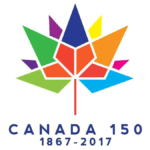This year your northern neighbor celebrates the 150th anniversary of The Confederation of Canada. A new exhibit is opening at the Museum of Canadian History in the city of Gatineau, highlighting 150 moments of Canada’s history.
You are thinking: Only 150 years? The French and the British have had colonies in what is now Canada since the 1600’s? During the American Revolution, 50,000 British Loyalists immigrated to Canada to flee the American experiment in self-rule.
Canada was not born out of a revolution or nationalist outburst. The formation of Canada was long. It was  an agreement that took seven years to negotiate. On July 1, 1867, the British Parliament told its colonies that they were now a Confederation with a responsible government. (You can read more about The British North American Act in the Canadian Encyclopedia). Political scientist Janet Ajzenstat argues the Canadian Confederation was influenced by the individualist ideology of John Locke. Based on writings of the time, Ajzenstat notes that the union of the British North American colonies was motivated by a desire to protect individual rights, especially the rights to life, liberty, and property.
an agreement that took seven years to negotiate. On July 1, 1867, the British Parliament told its colonies that they were now a Confederation with a responsible government. (You can read more about The British North American Act in the Canadian Encyclopedia). Political scientist Janet Ajzenstat argues the Canadian Confederation was influenced by the individualist ideology of John Locke. Based on writings of the time, Ajzenstat notes that the union of the British North American colonies was motivated by a desire to protect individual rights, especially the rights to life, liberty, and property.
Canada, while being a country, remained loyal to the monarchy. The constitution was finally “patriated” in 1982 by then Prime Minister, Pierre Trudeau (the current prime minister’s father). From the 1970s through the early 90s were contentious times between the French and English in Canada. One of my friends who worked in Ottawa said: “it’s funny, here, people don’t care that I am Chinese they ask if I am French or English”.
Canadians are not about hasty change. They are prudent and approach reform with “caution rather than zeal”. They are not about just getting it done and disrupting. Newfoundland was the last province to become part of Canada in 1949. And then the new province Nunavut was formed in 1999.
This week’s news story in Montreal illustrates the Canadian mindset:
“Quebec’s health minister is blaming human error after a medical instrument 33 centimetres long was forgotten inside a woman who had a surgery at a Montreal hospital last March. It took 2 months to detect. But Gaetan Barrette (Health Minister) is urging patients to not lose confidence in the health system.”
“There will never be zero mistakes and here you have a situation which proves there are never zero mistakes,” he told reporters in Quebec City. Mme Dubé, the patient, was remaining positive and is staying with her medical team (well she has no choice). (Here more details about this story)
That story, that comment, the patient’s attitude are all so Canadian.
That’s the Canadian way. Canadians approach change slowly and carefully; they are not about throwing everything away and starting from scratch. They admit that nothing is perfect, and that to err is human. Canada’s history is not all rosy, and the First Nations are still fighting for full recognition and rights. However, Canadians don’t give up and try to get along in their diversity of language and cultures.
Happy 150th Canada! This summer, try to be a little “Canadian”: enjoy the outdoors and time with family, use the phrase “the error is human”, don’t plan anything but lunch at noon and notice connections that you have to Canada. Many of your favorites are likely to come from Canada – music, beer, fries with gravy and cheese (poutine), art… and friends & neighbors.